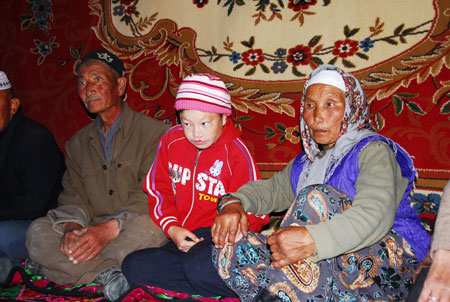 Mr.and Mrs.Honbay and their adopted 20-year old Han girl Marziya. [photo: Zhang Lei]
Mr.and Mrs.Honbay and their adopted 20-year old Han girl Marziya. [photo: Zhang Lei]
Although I prepared myself for the rareness of such a meeting, I was still surprised when I saw Kazak couple Mr.and Mrs.Honbay and their adopted 20-year old Han girl after a three hour drive from Urumqi.
Years of hardship have left deep creases on the couple’s faces. They spoke in low but gentle voices, looking at their beloved daughter from time to time, their eyes full of extraordinary emotion.
The mother, Biyitayhan, never lets her beloved daughter get far away from her arms. The girl has a noticeably cleft lip and is mentally disordered, and one can read her nervousness from the clinched fist in her mother’s hand. She doesn’t speak; however, whenever Biyitayhan embraced her or adjusted her hat, she looked peaceful and relaxed, her eyes sparkling with happiness.
On his traditional blanket, Mr. Honbay recalled how they made the decision to adopt the handicapped Han girl. “It was October 4th 1989 when my eldest son found a red bag in the nearby town,” he said. Inside the bag was a little girl sound asleep with a note saying, ‘This is a ten month old Han girl. Please, to the kind-hearted people who get this girl, please raise her.’”
The couple discovered that the girl was not only cleft-lipped, but was also intellectually retarded. As time passed by, they found the girl also had problems with her spine, as she could barely walk until she turned eight years old
How to handle such a poor little life stirred up controversy not only among the Honbay’s, but also in the village where Kazak is the dominant ethnic group. The Honbay’s invited their family members and friends to a formal occasion, celebrating their encounter with the little girl. During a Kazak traditional ritual, the couple named the girl Marziya, which means joyful and happy in the Kazak language.
For a family with 6 kids, the Honbay’s decision meant the family would face immeasurable burdens in the upcoming years. Their relatives, neighbors and friends were against such a move, saying the family would regret their choice when they realize that Marziya’s illness could not be fundamentally cured. However, the Honbay’s did not hesitate. “Marziya is a lovely life and because she was so unfortunate, we felt obliged that we must adopt her and bring good care and love to the poor little one,” Biyitayhan said.
In retrospect, the Honbay’s attribute their selflessness to Kazak’s profound ethnic traditions. “We Kazak people emphasize mutual help in our everyday life. As a Muslim population in China, we are Chinese people in the first place, and our Kazak tutelage says we must offer assistance and care to those in need,” Mr. Honbay said.

